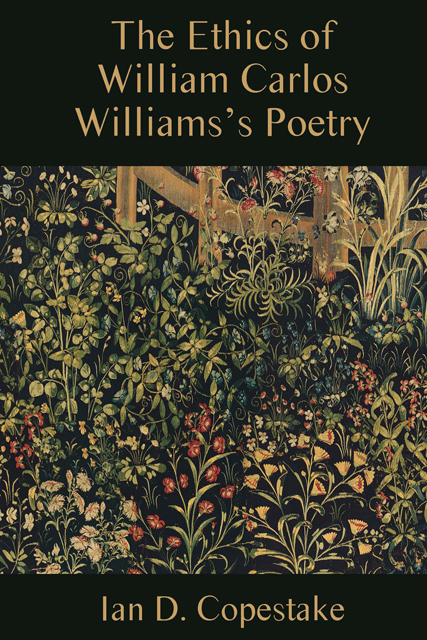Book contents
- Frontmatter
- Contents
- Acknowledgments
- List of Abbreviations
- Introduction
- 1 The Basis of Williams’s Faith in Art
- 2 Williams among the Pre-Raphaelites
- 3 A Pragmatic Approach: Williams and Emerson
- 4 Making a Start Out of Particulars: Paterson’s “Redeeming Language”
- 5 The Struggle to Believe: Williams’s Poetry of Service, Work, and Self
- Conclusion: Williams’s “Lifetime of Careful Listening”
- Bibliography
- Index
- Miscellaneous Endmatter
1 - The Basis of Williams’s Faith in Art
Published online by Cambridge University Press: 16 February 2023
- Frontmatter
- Contents
- Acknowledgments
- List of Abbreviations
- Introduction
- 1 The Basis of Williams’s Faith in Art
- 2 Williams among the Pre-Raphaelites
- 3 A Pragmatic Approach: Williams and Emerson
- 4 Making a Start Out of Particulars: Paterson’s “Redeeming Language”
- 5 The Struggle to Believe: Williams’s Poetry of Service, Work, and Self
- Conclusion: Williams’s “Lifetime of Careful Listening”
- Bibliography
- Index
- Miscellaneous Endmatter
Summary
IN 1906 WILLIAMS EXPRESSED HIS HATRED FOR “this medieval conception of a divine power with frowning brows who swats us one when we get in a dark corner,” an observation later echoed in his condemnations of the “Bible damnation theorem” with its postponement of “perfectibility to ‘heaven’ and all that heaven implies.” For Williams his stance against religion was part of his resistance to anything that acted as a barrier to valuing temporal and contemporary reality. Such statements have reinforced a critical consensus on Williams’s secular worldview, while the few commentaries that mention his religious background follow Mike Weaver’s argument that Williams’s creativity stemmed from his negotiation of the opposed temperament of his parents. Williams’s “volatile personality” is seen to be derived “from his mother,” the defeated romantic, equated with passion and a susceptibility to more extreme religious experiences such as her local renown as a medium. Meanwhile, his father represented the way “of reason, of Darwinian science and Unitarian faith.” In fact, those divisions are less stark, for as Williams’s autobiography indicates both his mother and father attended the spiritualist meetings at which Elena sometimes acted as a medium, while both were actively involved in later founding and helping to run the local Unitarian church. Elena’s involvement in town affairs was less apparant than Williams’s father’s, since she spoke little English. William George Williams was an excellent Spanish speaker, and so Spanish and French were more commonly used in the household than English when Williams and his brother were growing up. Elena’s limited English initially restricted her ability to involve herself directly in the goings on of the town, but her presence in the Unitarian church was felt in other ways. While William George acted as superintendant of the church Sunday school for nearly twenty years she played the piano regularly, an instrument that, among the congregation and to this day, remains synonomous with her. The differences of temperament between Williams’s parents are certainly important, and I will return to consider them in this chapter, but one consequence of Weaver’s argument has been to lessen the attention paid to the importance of Unitarianism to Williams despite it’s being the one religion he was prepared to defend throughout his life.
- Type
- Chapter
- Information
- The Ethics of William Carlos Williams's Poetry , pp. 15 - 31Publisher: Boydell & BrewerPrint publication year: 2010

